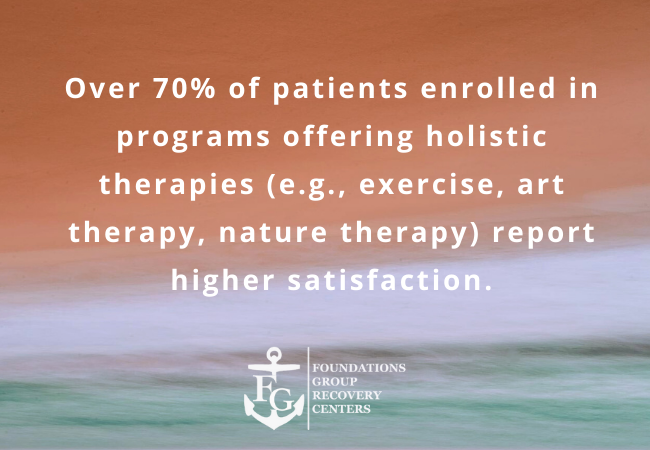Addiction affects far more than just the body. It touches every corner of a person’s life—their thoughts, their emotions, their relationships, and even their sense of purpose. That’s why treating addiction effectively often requires more than just detoxing or managing withdrawal symptoms. It demands a more complete, human-centered approach—one that addresses the mind, body, and spirit. Holistic addiction treatment is designed to do just that.
For individuals seeking meaningful and lasting recovery in Massachusetts, holistic approaches have become a powerful alternative or complement to more traditional addiction treatment. These methods aim not only to help people get sober but also to help them heal, grow, and thrive. In this post, we’ll explore what holistic addiction treatment really means, how it works, and why it may be a vital part of your recovery journey.
What Is Holistic Addiction Treatment?
Holistic addiction treatment refers to a comprehensive approach that treats the individual as a whole—mind, body, and spirit—rather than just focusing on the physical symptoms of addiction. This means combining evidence-based medical treatments with complementary therapies like yoga, meditation, nutrition, art therapy, acupuncture, and more.
It’s not about rejecting traditional medicine. Rather, holistic programs seek to integrate traditional methods with practices that nurture overall well-being. That includes emotional regulation, stress relief, spiritual growth, and a deeper understanding of self.
A Holistic Addiction Treatment Program in Massachusetts is designed to support people who want to break free from addiction while also learning how to live a more balanced, meaningful life. These programs recognize that recovery isn’t only about abstaining from drugs or alcohol—it’s about reclaiming your health, relationships, identity, and purpose.
The Mind: Healing Thoughts and Emotions
Mental health is deeply intertwined with addiction. Many individuals who struggle with substance use also suffer from anxiety, depression, trauma, or other emotional disorders. Holistic treatment often incorporates therapies that focus on emotional regulation, mindfulness, and thought patterns.
Mindfulness-based stress reduction (MBSR), cognitive-behavioral therapy (CBT), and meditation practices are often used to help individuals build resilience and self-awareness. Emotional healing allows people to understand the root causes of their addiction and begin to process long-held emotional pain. Integrating these therapies with other recovery work can create a stronger foundation for sobriety.
In Day Treatment Programs in Massachusetts, holistic approaches are often woven into a full schedule of therapy and skill-building. Clients might start the day with group therapy, followed by guided meditation or breathwork, then spend the afternoon in life-skills workshops or expressive therapies like music or art. This helps the brain begin to repair and adapt without substances while also developing healthier coping mechanisms.
The Body: Restoring Physical Health
Substance use often takes a serious toll on physical health. Nutrient deficiencies, insomnia, chronic pain, and fatigue are all common challenges early in recovery. Holistic treatment helps the body recover through improved nutrition, exercise, bodywork, and alternative healing modalities.
Regular movement—whether it’s yoga, hiking, strength training, or dancing—helps rebuild strength and stamina while also boosting mood. Many people in recovery report that reconnecting with their physical body helps them feel grounded and more in control of their emotions.
Nutrition counseling is also a key part of many holistic programs. When someone is deep in addiction, their eating habits often suffer. Learning to fuel the body with whole, nourishing foods can support both physical recovery and mental clarity. These practices are often available in Outpatient addiction Treatment in Massachusetts, offering structure without requiring a residential stay.
The Spirit: Reconnecting with Meaning and Purpose
Addiction often leads people to feel spiritually lost or disconnected—from their values, from others, or from themselves. Holistic treatment seeks to rebuild this connection. While this doesn’t necessarily mean religious practices, many holistic programs incorporate spiritual elements that help clients explore personal growth and purpose.
Journaling, nature immersion, creative expression, and group reflection all help clients reconnect with their inner lives. Many programs also offer opportunities to practice gratitude, forgiveness, and intention-setting. These activities allow for deep personal insight and can be a critical part of long-term healing.
Programs that take a Half Day Treatment Program in Massachusetts approach often balance spiritual work with core therapy, giving clients time each day to integrate these insights. Whether someone is attending full-day or half-day programming, the focus is always on wholeness and integration.
Flexibility and Continuum of Care
Another benefit of holistic treatment is how easily it can be incorporated into various levels of care. Whether you’re in residential treatment, a partial hospitalization program, or outpatient care, holistic methods can support your recovery at every stage.
For example, a Partial Hospitalization Program in Middletown, Ohio might incorporate yoga and meditation into its schedule alongside group therapy and individual counseling. These additions offer a calming balance to the intensity of early recovery.
Meanwhile, an Intensive Outpatient Program in Middletown, Ohio could include evening mindfulness classes or weekend wellness workshops, helping clients continue to build emotional and spiritual strength while reintegrating into their daily lives.
These programs are structured to provide support as clients step down in intensity. Holistic practices remain consistent, giving people the tools they need to cope with stress, reduce cravings, and stay centered even outside of treatment.

Holistic Detox and Medical Integration
One common myth is that holistic treatment means “no medicine,” but this isn’t true. Most reputable centers integrate holistic practices with evidence-based medical care. In a setting that provides Alcohol & Drug Detox in Massachusetts, for instance, clients receive medical supervision while also participating in holistic therapies that help ease withdrawal symptoms and reduce anxiety.
Detox is often the first step on the path to healing, but it can be one of the most physically and emotionally demanding parts of recovery. Practices like massage, acupuncture, and guided imagery can help the body release tension and pain, while also calming the nervous system. These practices make the detox process more comfortable and more humane.
From there, clients can transition into a more intensive phase of treatment—one that continues to support healing on every level.
Rebuilding a Life Beyond Addiction
Holistic addiction treatment helps people build sustainable recovery by giving them the tools they need to handle life’s challenges. It’s not about a quick fix—it’s about long-term transformation. From healthy relationships and coping skills to better nutrition and a more peaceful mind, holistic treatment offers a wide range of benefits that support overall well-being.
At a quality Addiction Treatment Program in Middletown, Ohio, clients may learn how to breathe through panic attacks, manage cravings with movement, or express pain through creative outlets. These are tools for life—not just for sobriety. They help individuals reconnect with their bodies, their emotions, their passions, and their goals.
Whether someone is just beginning their recovery journey or looking to deepen it, holistic care can provide the depth, flexibility, and compassion they need to succeed.
Why Choose Foundations Group Recovery Centers?
At Foundations Group Recovery Centers, we believe that every person deserves a chance to heal completely—not just physically, but emotionally and spiritually. Our programs are designed with the whole person in mind, combining evidence-based therapies with holistic care for truly integrated healing. If you’re looking for an Addiction Treatment Center in Massachusetts that understands the complexity of recovery and offers real, sustainable support, our team is here to help.
Conclusion
Healing from addiction requires more than willpower—it requires tools, guidance, and support that treat the whole person. Holistic addiction treatment brings together the body, mind, and spirit to promote long-term recovery, deeper self-awareness, and a renewed sense of purpose. At Foundations Group Recovery Centers, we’re committed to helping you build a future that’s not just sober—but fulfilling, joyful, and strong.
If you’re ready to explore your options and take the next step, call us today at (844) 763-4966 to learn more about our programs and how we can support your journey toward lasting recovery.
Frequently Asked Questions (FAQs)
What is holistic addiction treatment and how is it different from traditional treatment?
Holistic addiction treatment focuses on healing the whole person—mind, body, and spirit—by combining medical treatment with complementary therapies like yoga, meditation, nutrition, and emotional support. It differs from traditional treatment by incorporating these integrative methods to support long-term wellness, not just sobriety.
What therapies are typically included in a holistic addiction program?
Holistic programs often include mindfulness practices, yoga, acupuncture, nutritional support, exercise, art therapy, journaling, and group reflection. These therapies are designed to complement evidence-based treatments such as counseling and medication management.
Can holistic addiction treatment be part of outpatient care?
Yes, many outpatient programs integrate holistic approaches. Services such as mindfulness sessions, breathwork, or group therapy with a wellness focus can be included in outpatient addiction treatment plans to help clients maintain balance while managing daily responsibilities.
Is holistic treatment effective for alcohol and drug detox?
Holistic methods can play an important supportive role during alcohol and drug detox. While medical oversight is essential during detox, holistic practices like guided meditation, massage therapy, and nutrition counseling can ease withdrawal symptoms and reduce stress.
Who is a good candidate for holistic addiction treatment?
Anyone looking to heal not only from addiction but also from the emotional, physical, and spiritual damage it causes can benefit from holistic treatment. It’s especially valuable for individuals seeking a deeper connection with themselves and long-term transformation.

